Alok Sheel
Myself when young did eagerly frequent
Doctor and saint, and heard great argument
About it and about, but ever more
Came out by the same door as in I went.
- The Rubaiyat of Omar Khayyam
Gross domestic product (GDP) per capita has long been the most widely used measure of human welfare.
However, several other measures of objective and subjective well-being have been developed over the last few decades.
The relationship between GDP per capita and objective well-being, such as equality of various kinds, human development, environmental quality, as well as subjective outcomes like happiness is complex.
...
Why rich nations are not happier than poor countries
Image: Bhangra, a traditional Punjabi dance.Photographs: Munish Sharma/Reuters.
When we control for GDP per capita, poverty levels differ across countries, some are more unequal than others, crucial health and education outcomes vary, and subjective perceptions of well-being are unexpectedly different.
The view that we need to look beyond income and wealth to the use these are put has a long lineage from Aristotle to Jeremy Bentham to Amartya Sen.
Aristotle was of the view that the objective of life was not acquisition of wealth but "something else".
...
Why rich nations are not happier than poor countries
Image: Amartya Sen.Drawing on this philosophical insight, and the utilitarian tradition, Nobel Laureate Amartya Sen made a fundamental distinction between growth, which is a way of enhancing the means to attain that "something else", and "means usage" or the extent to which these means are used.
The latter can be measured through objective well-being indicators such as various human development indices, the best known of which is the United Nations "Human Development Index".
The reason behind the complex relationship between income/wealth and measures of well-being is perhaps because correlations are not linear across time.
...
Why rich nations are not happier than poor countries
Image: A tourist rides on a yak after a heavy snowfall near the India-China trade route, north of Gangtok.Photographs: Rupak De Chowdhuri/Reuters.
As GDP per capita rises, equality and environmental quality have been observed to worsen before they start improving after GDP per capita crosses a certain threshold that itself may be variable across societies.
Likewise, research has shown that although, on average, rich people are happier than poor people, the wealth-happiness correlation disappears after a point - the British economist Richard Layard even quantified this threshold at $15,000 a year!
Beyond this, it is the use to which wealth is put that may be a better indication of happiness. There are several instances of perfectly normal, reasonably happy middle-class individuals self-destructing after windfall gains through lotteries.
...
Why rich nations are not happier than poor countries
Image: Growth that is a necessary condition for improving well-being.Photographs: Reuters.
Well-being indices are important for policy-makers for interventions to optimise welfare outcomes.
Modern societies are wedded to the utilitarian objective of ensuring the greatest good for the greatest number first articulated by eighteenth century British philosophers and social reformers such as Jeremy Bentham and James Mill.
Policy-makers, however, need to have a clear understanding of developmental dynamics so that utilitarian interventions do not damage the very growth that is a necessary condition for improving well-being, and also gives the state the fiscal ammunition for corrective action.
A classic example is the treatment of inequality and inclusive growth. Development economists like Simon Kuznets and Arthur Lewis have cautioned us that rising inequality is a necessary concomitant of economic development.
...
Why rich nations are not happier than poor countries
Image: Income inequality, a major crisis.Photographs: Reuters.
The latter takes place through labour shifting from uniformly low levels of productivity to higher productivity jobs, typically in modern industry.
Incomes of workers in the latter rise faster than those still stuck in low-productivity jobs, thereby increasing inequality.
Once the crossover reaches a critical threshold, inequality starts declining via the classic inverted-U Kuznets curve.
Likewise, global integration initially increased income inequality across countries as colonies became suppliers of raw materials for industrialising Europe.
From the seventies, however, incomes of developed and developing countries started converging as erstwhile colonies started transiting to higher productivity jobs.
...
Why rich nations are not happier than poor countries
Image: A woman sleeps in front of her belongings, hanging from the shutters of a shop, in Kolkata.Photographs: Rupak De Chowdhuri/Reuters.
Paradoxically, global income convergence is increasing inequality nationally - in developing countries in the classic Kuznets manner as a concomitant of development; and in developed countries by increasing returns to capital at the cost of labour, because this critical factor of production remained relatively immobile, even as another factor of production, namely capital, became increasingly mobile.
The big picture, therefore, is that while growth may increase income inequality, everybody is better off in an absolute sense - some marginal groups excepted – relative to the starting point. A rising tide lifts all boats, although it may do so unequally.
The policy lesson from this complex relationship between income growth and well-being is to accelerate growth, while ensuring adequate safety nets for marginal groups, rather than get overly distracted by unequal outcomes and in the process put in place measures that might have a negative impact on growth.
...
Why rich nations are not happier than poor countries
Image: A handcart puller walks past the house of Railways Minister and Trinamool Congress (TMC) chief Mamata Banerjee in Kolkata.Photographs: Rupak De Chowdhuri/Reuters.
A decline in growth would lengthen the productivity crossover period, leading to net welfare loss.
Equality and inclusive growth are undoubtedly desirable social objectives, but policy-makers need to be clear about their target.
There is a clear difference between equality of outcomes, which is what the socialists and communists aimed for with remarkable failure, and equality of opportunity.
Since individual capabilities differ, and the market rewards different capabilities differently, even if you start from a position of absolute equality, over time inequality will increase.
...
Why rich nations are not happier than poor countries
Image: Dutch are most happy with their life.The utilitarian objective is, therefore, better achieved through policy interventions, including affirmative actions that aim to ensure equality of opportunity rather than equality of outcomes.
The relationship between growth and well-being becomes even more complex when we move from a purely objective or utilitarian measure of well-being to subjective measures such as happiness.
Consider the Easterlin paradox: on average, rich people are happier than poor peop#8804 rich countries are not happier than poor countries; as countries grow richer they don't become happier.
...
Why rich nations are not happier than poor countries
Image: A homeless man sleeps under a flyover as a herd of goats and sheep pass him during a hot day in Kolkata.Photographs: Rupak De Chowdhuri/Reuters.
Improving objective utilitarian measures of well-being assigns a major role to policy interventions by the state.
However, improving happiness might well involve policy forbearance on the part of the state since individual liberty has a major bearing on human happiness.
While the state is the ultimate guarantor of individual liberty, it can also be its single-biggest constraint.
John Stuart Mill, one of the most uncompromising proponents of individual liberty, revolted against the utilitarian principles of his own father, James Mill. A delicate balance has to be struck between utilitarian and libertarian interventions.
...
Why rich nations are not happier than poor countries
Image: Children sit on a horse cart while coming back from school near New Delhi.Photographs: Pawel Kopczynski/Reuters.
So, where do we stand once the background noise has died down and the smoke has blown away?
Some measures of well-being have a positive correlation with growth up to a point, and some beyond a certain threshold.
If we were to smoothen the curves and select one single measure of human progress across time, it would perhaps still be GDP per capita! The policy implication?
Interventions to improve well-being, while eminently desirable, should not damage growth, or suppress individual liberty.
...
Why rich nations are not happier than poor countries
Image: Farmers carry bundles of straw in Agartala.Photographs: Reuters.
This view is reinforced from the geo-political perspective.
Aggregate GDP is the single-best measure of geo-political dominance across space and time since this fixes the resources available to nation states.
It is hardly co-incidental that the dominant social, cultural, economic and geo-political power in the world today, and one of the freest societies, is the one with the highest GDP per capita and aggregate GDP among major economies. That country is, of course, the US.
How does the well-being balance stack up over the long term? Data gathered by the economic historian Angus Maddison indicates that since GDP per capita rose very gradually and did not differ greatly across major empires and kingdoms, almost everybody was poor right up to the Industrial Revolution.
...
Why rich nations are not happier than poor countries
Image: Deshengmen Embrasure Watchtower is lit by coloured lights in Beijing.Photographs: Jason Lee/Reuters.
From the viewpoint of objective, and more arguably subjective, well-being, on balance it perhaps did not matter where one lived, although geopolitically Asia arguably forged ahead after the high noon of the Roman Empire.
Following the Industrial age, those who lived in western Europe were markedly better off right up to the end of the nineteenth century, and those in the US until now.
The balance could shift to Asia from the second half of the twenty first century - but the jury is still out.
The author is a civil servant. These views are personal.







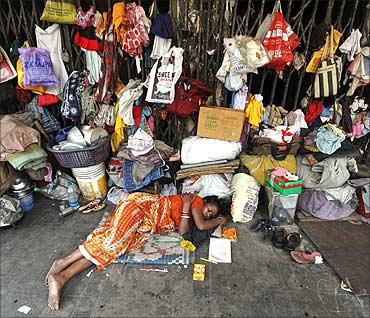
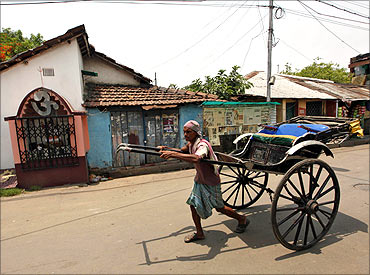

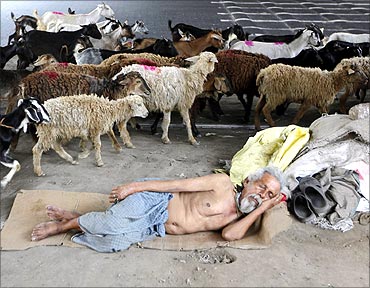
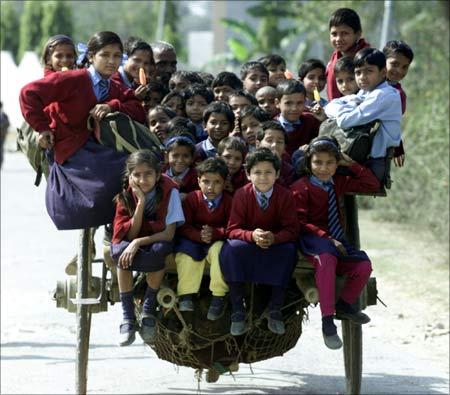

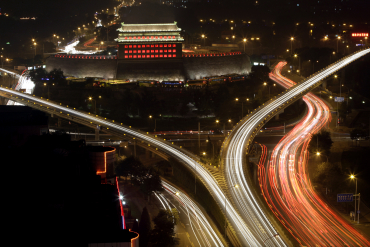

article